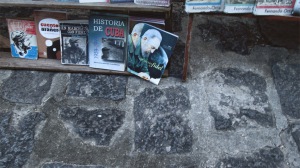A mere glimpse at the Cuban history of the 1940‘s and 1950‘s reveals that the nature of the relationship between Fulgencio Batista and Fidel Castro was far from normal. There’s evidence that can prove it.
The two families became acquainted when Raúl and Fidel were children. The Castro family lived in the town of Birán, not far from Banes, where the Batista family lived.

The Avance newspaper published a photo of a two- or three-year old Raúl Castro in the arms of Fulgencio Batista and the rumour has it that Batista even became the godfather in his baptism. Wouldn’t the current General have denied it if it wasn’t true?
Not even his brother Fidel did deny any content spread by many media before his death, for example, the information that Batista was the godfather at his wedding when he married Mirtha Díaz Balart, who was, by the way, daughter of one of Batista’s very close friends. As if this wasn’t enough, it seems that the newlyweds received a generous gift from Batista for their honeymoon in the United States: a thousand dollars, which was far from a modest amount at that time.
What we learn from the history is really disturbing: it was Fidel himself (not any other of the many lawyers who swarmed out in Havana) who made a plea before the courts to bring Batista to justice. He accused him of having suspended the much admired and progressive Constitution of 1940 in the coup d’état staged on March 10, 1952.
Not long ago, journalist Pedro A. García recounted the course of events after that historic day in an article published in the Granma newspaper, pointing out that there had been proliferation of criminality in Cuba and offering a list of the most significant victims murdered by the Police. One can only wonder why would Batista never want to get rid of Fidel Castro, to have him disappear from the map, despite having all the possibilities to do that.
Yet, these are not the only facts spread and circulating among the people that Cuban official historians surely couldn’t (or shouldn’t) overlook – facts showing that the nature of the relationship between the brothers Castro and Fulgencio Batista was stronger than we have ever imagined.
How can you explain the fact that Batista sent Fidel to a prison that offered great privileges to inmates, to which Fidel himself confessed in his letters? He even gave orders to his officers to make sure “that no harm is done to that boy”.
How can you explain the fact that Fidel served only a few months before being granted amnesty by Batista, which allowed him to escape from Cuba through the National Airport, hidden among other civilians?
Batista’s argument justifying his renouncement of power was that he didn’t want to shed more Cuban blood. His army consisted of more than 700 thousand well-armed men, a number that could never be beaten by a handful of Fidel’s guerrillas that Fidel had. The numbers say he could have won very easily.
Isn’t it clear, then, that Fulgencio Batista’s departure into exile (or his escape, whichever you prefer to call it) was a means of turning over the power to the son of his friend and godfather, Ángel Castro?
May mysteries of the human soul be uncovered one day!
One more thing: Fidel shot thousands of soldiers faithful to Batista; hundreds of them were held behind bars for decades. Isn’t it surprising that Batista had never attempted to take revenge on Fidel? Or vice-versa, why would the new dictator, with so much power in his hands, have never tried to kill Batista during his long stay in the Spanish resort of Marbella, or any time later, when he moved to Florida?
Without further ado, I think that the relationship between Batista and Castro deserves a thorough psychological and historical analysis.

Leave a comment